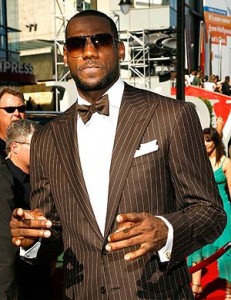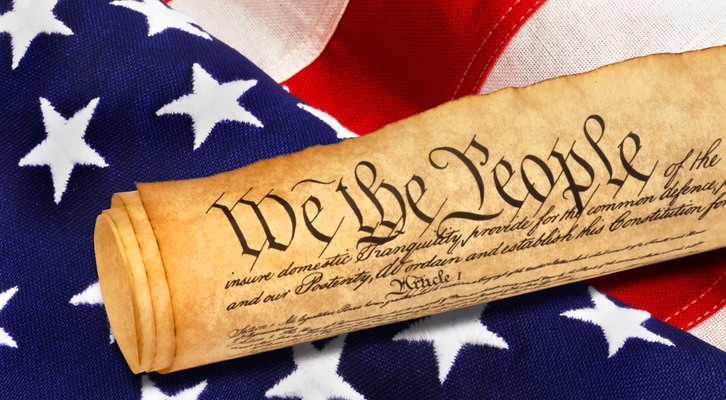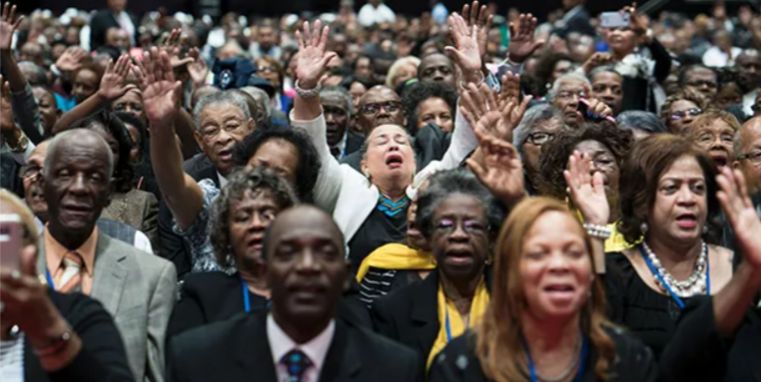(ThyBlackMan.com) Yes, there are undeniable racial components to the LeBron James hate of the past two months. But the sinister subset of America that finds it easier to loathe him because he’s a black man is old, boring news. More interesting to me is the mood of the “black community.”
Much of the country might dislike LeBron James, but black people don’t.
You’ve probably heard about his plummeting Q rating (the industry standard for measuring an athlete’s familiarity and appeal). According to The Q Scores Co., for non-blacks, LeBron’s positive Q rating went from 18 percent in January to 10 percent in September and, more telling, his negative Q rating went from 24 percent to 44. Nearly half of the non-blacks in this country don’t like the dude. Meanwhile, LeBron’s positive Q rating  among blacks went from 52 percent in January to 39 — a noticeable drop — but his negative Q rating barely budged, going from 14 percent to 15. Among African-Americans, says The Q Scores Co. executive vice president Henry Schafer, the shift in opinion was mostly to neutral.
among blacks went from 52 percent in January to 39 — a noticeable drop — but his negative Q rating barely budged, going from 14 percent to 15. Among African-Americans, says The Q Scores Co. executive vice president Henry Schafer, the shift in opinion was mostly to neutral.
The general, expressed sentiment of African-Americans has been, “I may not have agreed with how LeBron carried the whole free-agency thing, but I’m not gonna hate the man.” The more America shuns LeBron, the more Black America retreats to his corner. In fact, as America hates LeBron more and more, Black America’s collective hug embraces LeBron tighter and tighter. It’s called black protectionism.
Athletes have always been inspirational figures within the black community and — as far back as Jack Johnson, Jesse Owens and Jackie Robinson — often have taken the public racial hit for the team. So, naturally, through the years, they’ve engendered an almost automatic protectionism response whenever America — whether justifiably or not — decides it wants to hate them.You saw it with Hank Aaron. You saw it with Barry Bonds. You saw it with Allen Iverson. You saw it with Michael Vick. You’re seeing it now with LeBron James. There are plenty of black folks who want LeBron to drop 60 on the Cavs when he visits Cleveland and wouldn’t mind the maligned Heat winning a championship.
A few days ago, I headed to the barbershop in Atlanta. Hashir Smith, a Cavs/LeBron fan and Loft 109’s owner, smiled, gave me a pound and noted my extended absence. “Man,” he said, “we ain’t seen you since ‘The Decision’!”
Ah, “The Decision.” I strolled into the shop the Saturday after LeBron’s announcement to get my hair cut and to gauge the reaction. Curiously, probably, to many Americans, but unsurprisingly to me, there was absolutely no anger to be found in the shop full of black men.
Disappointment? Sure. LeBron fatigue? Of course. And in a barbershop full of guys from everywhere but Atlanta — with Knicks fans, Lakers fans, Bulls fans, you name it — there was maybe even some “hating.”
Don’t get it twisted, though. The modern, colloquial version of “hating” has more to do with jealousy than hate or rancor. Hashir is a Cavs fan. My barber, Steve, is a Knicks fan. They were hating, but you wouldn’t find one seed of ill will. The most palpable reaction was intrigue. Why did LeBron choose Miami; what does that say about him as a player/man; and how are the Heat going to fare next season?
Meanwhile, the rest of the country had just left the blocks in the 100-yard dash to make LeBron one of the most vilified athletes in America. The good ol’ “two Americas” syndrome, as it is wont to do, was rearing its butt-ugly, ever-present head — again.
So, here we were about two months later and the angry mob was still after LeBron.
CNBC had released the report that LeBron was now the sixth most disliked athlete in America and, scrolling across the bottom of the flat screen tuned to ESPN, were quotes from Dallas Mavericks owner Mark Cuban, spitting his two cents on LeBron and “The Decision.” “I don’t even have a problem that he had the TV show,” Cubes said. “But it turned out to be the largest public humiliation in the history of sports. He humiliated the organization; he humiliated the state of Ohio, the city of Cleveland. All of a sudden, he became a bad guy; he lost a billion dollars in brand equity, give or take a couple bucks here or there.”
That’s when one of the barbershop patrons bellowed, “Yo, all these dudes need to get off his [case],” inserting a more vulgar term for “case.”
That’s what we call “black protectionism.”
Katheryn Russell-Brown coined the term in the immediate aftermath of the O.J. Simpson trial. She remembers watching the split-screen reactions of Simpson’s not guilty verdict, seeing what she recalls as white-hot rage from white people and unbridled jubilation from black people. In her book, “Protecting Our Own: Race, Crime, and African Americans,” she defines black protectionism as, “the response by large numbers of the black community to allegations that a famous black person has engaged in a criminal act or ethical violation. The response is protective in that it denies, excuses or minimizes the charges.”
This is conditioned behavior. Black male history in this country began with the slave trade, lynchings, wrongful deaths and wrongful imprisonments. The experience has bred a skepticism. “Why do you hate this black man?” And it has bred a defense mechanism. “Leave this black man alone.” There also remains a success gap in America, even as more African-Americans succeed. The ones who make it often get cub treatment from the “mama bear” of the community.
What makes LeBron even more ripe for protectionism is the fact that he hasn’t been charged with a crime or accused of an ethical violation. Nah, he just angered a bunch of sports fans with a wack decision and an even wacker “Decision,” and now half of America thinks he’s either a punk or a jerk.
If that were merely it, if folks just said, “Eh, I don’t really like the guy — I think he’s kind of a jerk,” the black protectionism probably wouldn’t be so strong. But there are yahoos in Cleveland burning his jersey, brewing smarmy beer called “Quitness,” and putting up ingrate billboards. Frothy-mouthed Cavs owner Dan Gilbert made like Syndrome from “The Incredibles,” sending out a maniac missive, stopping just short of calling down evil upon LeBron. Even NBA legends — mostly black men, coincidentally — got in on the action. Charles Barkley called LeBron’s free agency choice a “punk move.” It seems everybody and their mothers have weighed in to let LeBron know just how much they don’t like him.
And for what? Why? Because “The Decision” was annoying and self-indulgent? I’m sorry, but Brett Favre was nowhere to be found on The Q Scores Co.’s top 10 most disliked list. And, dig this: America dislikes LeBron more than it dislikes Ben Roethlisberger. That’s just not deserved. So, you know what? Enter the ride-or-die black community.
“The more LeBron is vilified,” Russell-Brown said, “the more the community will respond. Protectionism comes in as a tempering.”
A few weeks ago, airport-hopping while on vacation, I saw at least a half dozen Miami Heat, LeBron No. 6 jerseys — all worn by black men. Given today’s anti-LeBron climate, rocking his jersey is a fairly defiant act. It says, “Screw the rest of these folks, LeBron, I’m riding with you, homeboy.” It might seem as if LeBron is on an island, right now, but something tells me he knows he’s not alone.
Written By Vincent Thomas

















Leave a Reply